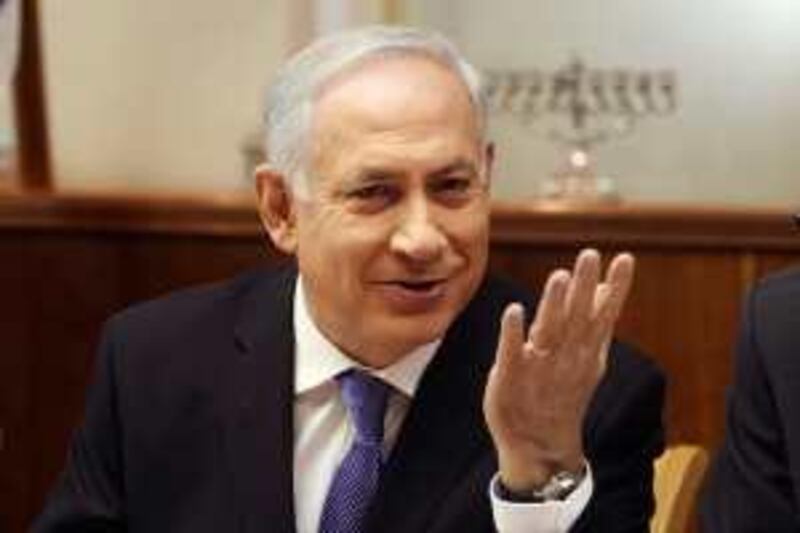TEL AVIV // Israel's predominantly right-wing, pro-settler government decided to increase funding and social benefits to dozens of Jewish settlements in the occupied West Bank yesterday in an apparent bid to mollify their resistance to a partial construction freeze.
The cabinet of Benjamin Netanyahu, the prime minister, voted 21-5 to add the settlements to a national programme that would entitle them to more state funding in such areas as transportation, infrastructure, health care or employment. Some Israeli commentators said the move contradicted the government's decision last month to suspend the granting of new building permits for Jewish settlements in the West Bank for the next 10 months, a step it took following months of pressure from the United States.
Michael Warschawski, the founder of the Jerusalem-based Alternative Information Centre, a joint Israeli-Palestinian political advocacy group, said: "This decision is a political statement directed at Washington. Netanyahu is making clear that he has no intention of freezing anything in the settlements. This confirms that Netanyahu is extremely provocative, and bordering on rudeness, concerning the Obama administration's demands on the settlements."
The addition of settlements to the national programme angered many in the centre and left of Israeli politics yesterday. All five ministers of the Labor Party, the only centrist member of Mr Netanyahu's coalition, voted against the plan, protesting that it included isolated Jewish communities that were not part of the major settlement blocs Israel plans to keep under any peace deal with the Palestinians.
Isaac Herzog, the minister of welfare and social services who is a member of Labor, said after the vote: "There is no use - in approving preferential treatment to communities that won't be part of a final settlement between us and the Palestinians." Chaim Oron, head of the left-wing Meretz Party, which is in the opposition, warned that the scheme would further delay prospects for a resumption of stalled peace negotiations. He said: "The government's decision shows that a renewal of the peace process is not a national priority and that Netanyahu and his colleagues are moving towards a confrontation with the American administration and the international community."
The plan approved by Israel would include about 100,000 settlers in a national programme that would grant a total of about two million Israelis so-called preferential treatment in areas such as schools, job opportunities and health care. Israeli media estimated that the programme would invest about 1,000 Israeli shekels (Dh970) on average per person. A spokesman for Mr Netanyahu, however, insisted that there was "no contradiction" between the additional funds for the settlers and the temporary construction curbs, and added that none of the settlers' benefits would be in housing.
Some Israeli analysts accused Mr Netanyahu of caving in to settler demands and looking out for his own political survival by pushing for his cabinet to give the plan the green light. Nehemiya Shtrasler, a prominent commentator for Haaretz, a liberal Israeli newspaper that has typically supported Mr Netanyahu's economic-related policies, wrote that the state programme should be composed of areas far away from Israel's commercial centre that are fighting high unemployment instead of including many settlements that are less than an hour away from the central city of Tel Aviv.
Shtrasler added: "The wink to the settlers and the surrender to narrow political interests is a bad mistake from the socioeconomic perspective. This is a difficult blow to the residents of the real peripheral areas." Indeed, Peace Now, an Israeli anti-settlement group, last week estimated that the settlements have higher income and education levels, and a lower jobless rate, than the average Israeli community. Benefits given to so-called preferred areas include tax breaks for business, funds for technological incubators, financial aid for agriculture and housing loans.
Yuval Steinitz, Israel's finance min ister and a member of Mr Netanyahu's right-wing Likud Party, was quoted on Israeli radio as saying the addition of settlements to the programme showed them that despite the partial freeze, Israel "also supports and reinforces" them. Settlers have increasingly stepped up opposition to the government's partial construction freeze, embarking on mass protests near Mr Netanyahu's Jerusalem residence and blocking inspectors from enforcing the suspension. Some of the more hardline settlers were blamed last weekend for vandalising a mosque in a Palestinian village in the northern West Bank, burning prayer carpets and holy books and spraying hate messages in Hebrew.
The mosque torching has prompted concerns among Israeli defence officials of possible reprisals. Yesterday, militants from the Gaza Strip, ruled by Hamas, fired two rockets at Israel in the latest violation of a moratorium on attacks that was announced by Gaza factions last month. Furthermore, the Israeli military said that a Jewish settler woman was slightly to moderately wounded after being stabbed on a roadside by a Palestinian in the West Bank late on Saturday.
foreign.desk@thenational.ae





